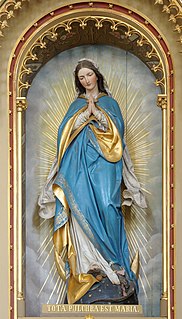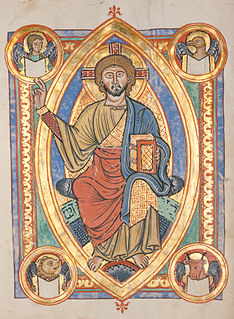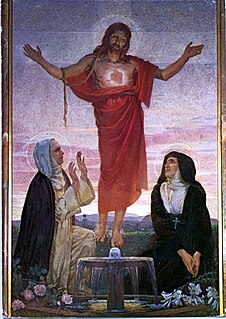
The Hail Mary is a traditional Christian prayer addressing Mary, the mother of Jesus. The prayer is based on two biblical passages featured in the Gospel of Luke: the Angel Gabriel's visit to Mary, and Mary's subsequent visit to Elisabeth, the mother of John the Baptist. The Hail Mary is a prayer of praise for and of petition to Mary, regarded as the Theotokos. Since the 16th century, the version of the prayer used in the Catholic Church closes with an appeal for her intercession. The prayer takes different forms in various traditions, and has often been set to music.

The epiclesis refers to the invocation of one or several gods. In ancient Greek religion, the epiclesis was the epithet used as the surname given to a deity in religious contexts. The term was borrowed into the Christian tradition, where it designates the part of the Anaphora by which the priest invokes the Holy Spirit upon the Eucharistic bread and wine in some Christian churches. In most Eastern Christian traditions, the Epiclesis comes after the Anamnesis ; in the Western Rite it usually precedes. In the historic practice of the Western Christian Churches, the consecration is effected at the Words of Institution though during the rise of the Liturgical Movement, many denominations introduced an explicit epiclesis in their liturgies.

The First Saturdays Devotion, also called the Act of Reparation to the Immaculate Heart of the Blessed Virgin Mary, is a Catholic devotion which, according to Sister Lúcia of Fátima, was requested by the Virgin Mary in an apparition at Pontevedra, Spain, in December 1925. This devotion has been approved by the Roman Catholic Church.

Mary, Mother of Grace is a Roman Catholic prayer to the Blessed Virgin Mary.

The following are Roman Catholic prayers to Saint Joseph.

Consecration is the solemn dedication to a special purpose or service. The word consecration literally means "association with the sacred". Persons, places, or things can be consecrated, and the term is used in various ways by different groups. The origin of the word comes from the Latin stem consecrat, which means dedicated, devoted, and sacred. A synonym for consecration is sanctification; its antonym is desecration.

A troparion in Byzantine music and in the religious music of Eastern Orthodox Christianity is a short hymn of one stanza, or organised in more complex forms as series of stanzas.

A grace is a short prayer or thankful phrase said before or after eating. The term most commonly refers to Christian traditions. Some traditions hold that grace and thanksgiving imparts a blessing which sanctifies the meal. In English, reciting such a prayer is sometimes referred to as "saying grace". The term comes from the Ecclesiastical Latin phrase gratiarum actio, "act of thanks." Theologically, the act of saying grace is derived from the Bible, in which Jesus and Saint Paul pray before meals. The practice reflects the belief that humans should thank God who is the origin of everything.

Catholic devotions are particular customs, rituals, and practices of worship of God or honour of the saints which are in addition to the liturgy of the Catholic Church. The United States Conference of Catholic Bishops describes devotions as "expressions of love and fidelity that arise from the intersection of one's own faith, culture and the Gospel of Jesus Christ". Devotions are not considered part of liturgical worship, even if they are performed in a church or led by a priest, but rather they are paraliturgical. The Congregation for Divine Worship at the Vatican publishes a Directory on Popular Piety and the Liturgy.
In Roman Catholicism, the morning offering is a prayer said by an individual at the start of the day in order to consecrate oneself to Jesus Christ. The practice has traditionally been associated with the Apostleship of Prayer. While since 1929 the Pope has added a general and a mission intention to the traditional morning offering prayer each month, Pope Francis has restored this to the original, single monthly intention. Over time other forms of the morning offering prayer have been suggested.

Thanksgiving after Communion is a spiritual practice among Christians who believe in the Real Presence of Jesus Christ in the Communion bread, maintaining themselves in prayer for some time to thank God and especially listening in their hearts for guidance from their Divine guest. This practice was and is highly recommended by saints, theologians, and Doctors of the Church.

Reparation is a theological concept closely connected with those of atonement and satisfaction. In ascetical theology, reparation is the making of amends for insults given to God through sin, either one's own or another's. The response of man is to be reparation through adoration, prayer, and sacrifice. In Roman Catholic tradition, an act of reparation is a prayer or devotion with the intent to expiate the "sins of others", e.g. for the repair of the sin of blasphemy, the sufferings of Jesus Christ or as Acts of Reparation to the Virgin Mary.

Catholic tradition includes specific prayers and devotions as acts of reparation for insults and blasphemies against Jesus Christ and the Holy Name of Jesus. These include the sufferings during the Passion of Jesus. Similar prayers as Acts of Reparation to the Virgin Mary and Acts of Reparation to The Holy Trinity also exist.
The usual beginning is the series of prayers with which most Divine Services begin in the Eastern Orthodox Church and those Eastern Catholic Churches which follow the Byzantine Rite.

The Prayer of Consecration to the Sacred Heart of Jesus is a Roman Catholic prayer composed by Pope Leo XIII. It was included in the 1899 encyclical Annum sacrum issued by Leo XIII as he consecrated the entire world to the Sacred Heart of Jesus.

Among Eastern Orthodox and Eastern-Rite Catholic Christians, holy water is blessed in the church and given to the faithful to drink at home when needed and to bless their homes. In the weeks following the Feast of Epiphany, clergy visit the homes of parishioners and conduct a service of blessing using the holy water that was blessed on the Feast of Theophany. For baptism, the water is sanctified with a special blessing.
The embolism in Christian liturgy is a short prayer said or sung after the Lord's Prayer. It functions "like a marginal gloss" upon the final petition of the Lord's Prayer, amplifying and elaborating on "the many implications" of that prayer. According to the 1913 Catholic Encyclopedia, "[t]he embolism may date back to the first centuries, since, under various forms, it is found in all the Occidental and in a great many Oriental, particularly Syrian, Liturgies."

Spiritual communion is a Christian practice of desiring union with Jesus Christ in the Eucharist. It is used as a preparation for Mass and by individuals who cannot receive holy communion.

The Litany of the Sacred Heart of Jesus is a formal prayer in the Catholic Church dedicated to Sacred Heart of Jesus. It is one of six approved litanies for public use. In 1899, Pope Leo XIII approved the Litany of the Sacred Heart of Jesus for public usage

The First Thursdays Devotion, also called the Act of Reparation to the Wounds of Jesus and to the Holy Eucharist, is a Catholic devotion to offer acts of reparation. It is based on purported apparitions of Christ at Balazar, Portugal, reported by Alexandrina Maria da Costa.















